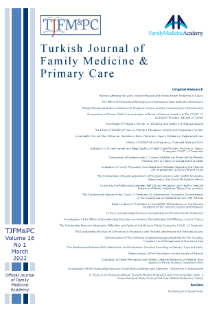Gebelerde algılanan psikolojik eziyet düzeyi ve etkileyen faktörler
ebe, gebe, eş istismarı
Determination of perceived psychological maltreatment level in pregnant women
pregnant women, violence, spousal abuse,
___
- 1. Maiuro R. Perspectives on Verbal and Psychological Abuse. Springer Publishing Company; 2015.
- 2. Bozkurt ÖD, Daşıkan Z. Partner Violence During Pregnancy : Risk Factors, Health Outcomes and Screening Tools. Turkiye Klinikleri J Obstet Womens Health Dis Nurs-Special Topics. 2016;2(2):15-22.
- 3. JamesL, Brody D, Hamilton Z. Risk factors for domestic violence during pregnancy: a meta-analytic review. Violence and Victims, 2013;28.3: 359-380.
- 4. Sağkal T, Kalkım A, Uğurlu ES, Kırmızılar N. The Situation of Pregnant Women Exposure to Violence by Husband and the Factors Associated With Violence. TAF Preventive Medicine Bulletin. 2014;13(5).
- 5. Follingstad DR. The impact of psychological aggression on women's mental health and behavior: Thestatus of the field. Trauma, Violence, & Abuse. 2009; 10(3), 271-289.
- 6. Lagdon S, Armour C, Stringer M. Adult experience of mental health outcomes as a result of intimate partner violence victimization: a systematic review. European Journal of Psychotraumatology. 2014;5(1):24794.
- 7. Capaldi DM, Knoble NB, Shortt JW, Kim HK. A systematic review of risk factors for intimate partner violence. Partner Abuse. 2012;3(2):231-280.
- 8. World Health Organization. Understanding and addressing violence against women. Published 2012. Erişim adresi: https://www.who.int/reproductivehealth/topics/violence/vaw_series/en/. Erişim tarihi: 15.07.2020
- 9. Cem Ersoy N, Hünler OS, Namer Y. Psychological Maltreatment of Women Inventory Short Form - Turkish adaptation. J Clin Psy. 2017;20(4):276-286.
- 10. Hacettepe Nüfus Etütleri Enstitüsü. Türkiye’de kadına yönelik aile içi şiddet araştırması. Ankara: Elma Teknik Basım Matbaacılık; 2015.
- 11. Tolman RM. The development of a measure of psychological maltreatment of women by their male partners. Violence Vict. 1989;4(3):159-177.
- 12. Han A, Stewart DE. Maternal and fetal outcomes of intimate partner violence associated with pregnancy in the Latin American and Caribbean region. Int J Gynaecol Obstet. 2014;124(1):6-11.
- 13. Lee S, Lee E. Predictors of intimate partner violence among pregnant women. International Journal of Gynecology & Obstetrics. 2018;140(2):159-163.
- 14. Cengiz H, Kanawati A, Yıldız S, Süzen S, Tombul T. Domestic violence against pregnant women: A prospective study in a metropolitan city, İstanbul. J Turk Ger Gynecol Assoc. 2014;15(2):74-77.
- 15. Arslantaş H, Adana F, Ergin F, Gey N, Biçer N, Kıranşal N. Domestic violence during pregnancy in an eastern city of Turkey: a field study. J Interpers Violence. 2012;27(7):1293-1313.
- 16. Cheung DST, Tiwari A, Chan KL, et al. Validation of the Psychological Maltreatment of Women Inventory for Chinese Women. J Interpers Violence.2020;35(21-22):4614-4639. doi:10.1177/0886260517715602.
- 17. Começanha R, Maia Â. Screening Tool for Psychological Intimate Partner Violence: Portuguese Validation of the Psychological Maltreatment of Women Inventory. Violence Vict. 2018;33(1):75-90.
- 18. Devries KM, Kishor S, Johnson H, et al. Intimate partner violence during pregnancy: analysis of prevalence data from 19 countries. Reproductive Health Matters. 2010;18(36):158-170.
- 19. Lencha B, Ameya G, Baresa G, Minda Z, Ganfure G. Intimate partner violence and its associated factors among pregnant women in Bale Zone, Southeast Ethiopia: A cross-sectional study. PLoS One. 2019;14(5):e0214962.
- 20. Sarkar NN. The cause and consequence of domestic violence on pregnant women in India. J Obstet Gynaecol. 2013;33(3):250-253.
- 21. Yanikkerem E, Karadaş G, Adigüzel B, Sevil U. Domestic violence during pregnancy in Turkey and responsibility of prenatal healthcare providers. Am J Perinatol. 2006;23(2):93-103.
- 22. Habib S, Abbasi N, Khan B, Danish N, Nazir Q. Domestic Violence Among Pregnant Women. J Ayub Med Coll Abbottabad. 2018;30(2):237-240.
- 23. Priya A, Chaturvedi S, Bhasin SK, Bhatia MS, Radhakrishnan G. Are pregnant women also vulnerable to domestic violence? A community based enquiry for prevalence and predictors of domestic violence among pregnant women. J Family Med Prim Care. 2019;8(5):1575-1579.
- 24. Garg S, Singh MM, Rustagi R, Engtipi K, Bala I. Magnitude of domestic violence and its socio-demographic correlates among pregnant women in Delhi. J Family Med Prim Care. 2019;8(11):3634-3639.
- 25. Dönmez G, Şimşek H, Günay T. Spouse violence and related factors in married men. Turk J Public Health. 2012;10(3):151-159.
- ISSN: 1307-2048
- Yayın Aralığı: Yılda 4 Sayı
- Başlangıç: 2007
- Yayıncı: -
Oksitosin Düzeyi ile Postpartum Depresyon Arasındaki İlişki
Kanser Taramasında Mobil Uygulamaların Kullanılması ve Etkinliğinin Değerlendirilmesi
Funda Yıldırım Baş, Başak Aslı Çankaya, Arda Çankaya
Prateek Saurabh Shrivastava, Saurabh RamBihariLal Shrivastava
Öğrenme Ortamının Değerlendirilmesi
Giray KOLCU, Mukadder İnci BAŞER KOLCU
Hemşire Liderliğinde Okul Temelli Sağlıklı Beslenme Temalı Motor Oyun Aktiviteleri
Selda CERİM, Meryem Öztürk HANEY
Öznur Kübra ODABAŞ, Ezgi AĞADAYI
Obezite ile Mücadelede Obezite Merkezleri; Antalya İli Örneği
Sigara Bırakma Sürecinde Vareniklin Kullanan, Tip 1 Diyabet Tanısı Alan Bir Hasta: Olgu Sunumu
Selin ADATEPE YAPICI, Ayşe ÖZMEN, Muhammet HASAR, Yelda ÖZER, Çiğdem GEREKLİOĞLU, Sevgi ÖZCAN
Üreme Baskısı Ölçeğinin Türkçe'ye Uyarlanması: Geçerlilik ve Güvenirlik
COVID-19 GİBİ SALGINLARDA EVDE BAKIM HİZMETLERİNİN ÖNEMİ: KISA BİR BAKIŞ
